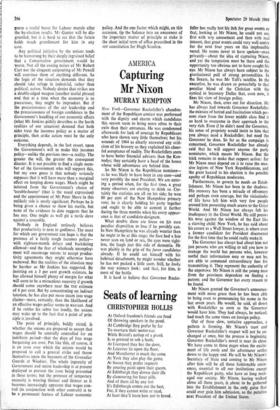Capturing Mr Nixon
AMERICA MURRAY KEMPTON
New York—Governor Rockefeller's abandon- ment of the Republican contest was performed with the dignity and charm which candidates this season seem to bring more often to their exits than their entrances. He was condemned afterwards for lack of courage by Republicans who have shown very little themselves; but his wounds of 1964 as clearly answered any criti- cism of his bravery as they explained his cheer- ful acceptance of reality. The Rockefellers seem to have better financial advisers than the Ken- nedys; they certainly have a head of the house whose wild adventures are behind him.
So Mr Nixon is the Republican nominee— as he was likely to have been in any case—and very possibly the next President. We are enter- ing a period when, for the first time, a great many observers are starting to think so. Cer- tainly the statistics are all on his side; he won 80 per cent of the New Hampshire primary vote; he is clearly holding his party together and ought to be able to cement it further during the three months when his every appear- ance is that of candidate-designate.
What doubts there are focus on his own peculiar disposition to lose if he possibly can. In New Hampshire he was already wearier than he ought to be at this stage; the face had a hue never seen on land or sea, the eyes were sight- less, the laugh just this side of dementia. He was plainly in the grip of the furor candidatus already. If he could see himself with his habitual detachment, he might wonder whether he has not peaked a little soon. Still, he looks the way winners look: and that, for him, is most of the battle.
It is hard to believe that Governor Rocke- feller has really lost his itch for great events or that, looking at Mr Nixon, he could not see, first with wry amusement and then with real interest, that great events could very well centre for the next four years on this implausible vessel. He seems never to have spoken—even privately—about the idea of capturing Nixon, and yet the temptation must be there and the opportunity too obvious not to have caught his eye. Mr Nixon has always been subject to the gravitational pull of strong personalities. In the Senate, he was Mr Taft's satellite. In the executive, he was drawn so powerfully to that peculiar blend of the Christian with the cynical in Secretary Dulles that, even now, it fixes his view of foreign policy.
Mr Nixon, then, cries out for direction. He has always had towards Governor Rockefeller the mixture of hatred and fascination which per- sons risen from the lower middle class find it so hard to overcome in their approach to the very rich. Even if he didn't need the Governor, his sense of propriety would insist to him that you always need a Rockefeller; but need the Governor he does. So far as the campaign is concerned, Governor Rockefeller has already said that he will support anyone the party nominates, which means Mr Nixon. But the trick remains to make that support active: for Mr Nixon must depend on it to raise the mas- sive legions of New York Republicanism, and the great hazard to his election is the possible apathy of Republican moderates.
Furthermore, to govern he needs an Estab- lishment. Mr Nixon has been in the shadows. His recovery has been a miracle of effrontery and perhaps even courage, but the vicissitudes of life have left him with very few people around him possessing much access to the Great World. And Mr Nixon has always felt his inadequacy in the Great World. He still presses his nose against the window of the East like a starving child; New York, he has said about his career as a Wall Street lawyer, is where even a former candidate for President discovered for the first time that he could really make it.
The Governor has always had about him not just persons who are willing to tell you how to manage the world but persons who, however useful their information may or may not be, are able to command extraordinary fees for transmitting it. They represent the authority of the expensive. Mr Nixon is still the young man from the provinces dependent on finding a patron; and the Governor has every reason to be found.
Mr Nixon greeted the Governor's announce- ment with more grace than he has been able to bring even to pronouncing his name in the last seven years. He would, he said, sit down with Rockefeller as soon as the Governor would have him. They had always, he noticed, had much the same views on foreign policy.
Out of these slow, tentative approaches, a pattern is forming. Mr Nixon's trust and Governor Rockefeller's respect will not be ex- changed at once, but the process is beginning. Governor Rockefeller's novel is near its close. We have come to those pages when the excite- ment of life cools and the adventurer settles down to the happy end. He will be Mr Nixon's Secretary of State and coming to Mr Nixon after him will be all those fashionable emin- ences, essential to all our institutions except the Republican party, who have so long man- aged our society. Mr Nixon, having walked alone all these years, is About to be gathered into the Establishment in the only guise that could ever gain him admission, as the putative next President of the United States.






































 Previous page
Previous page